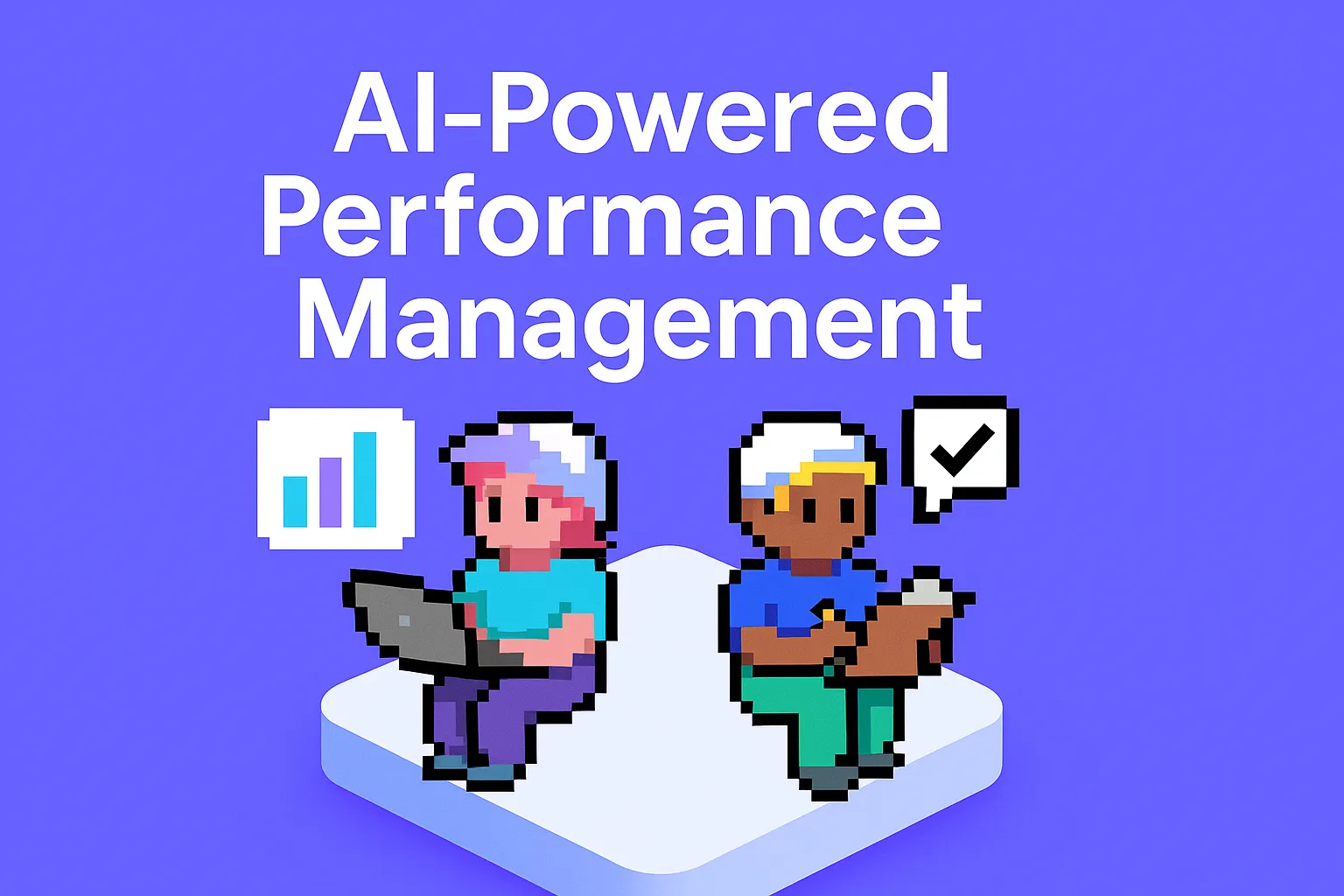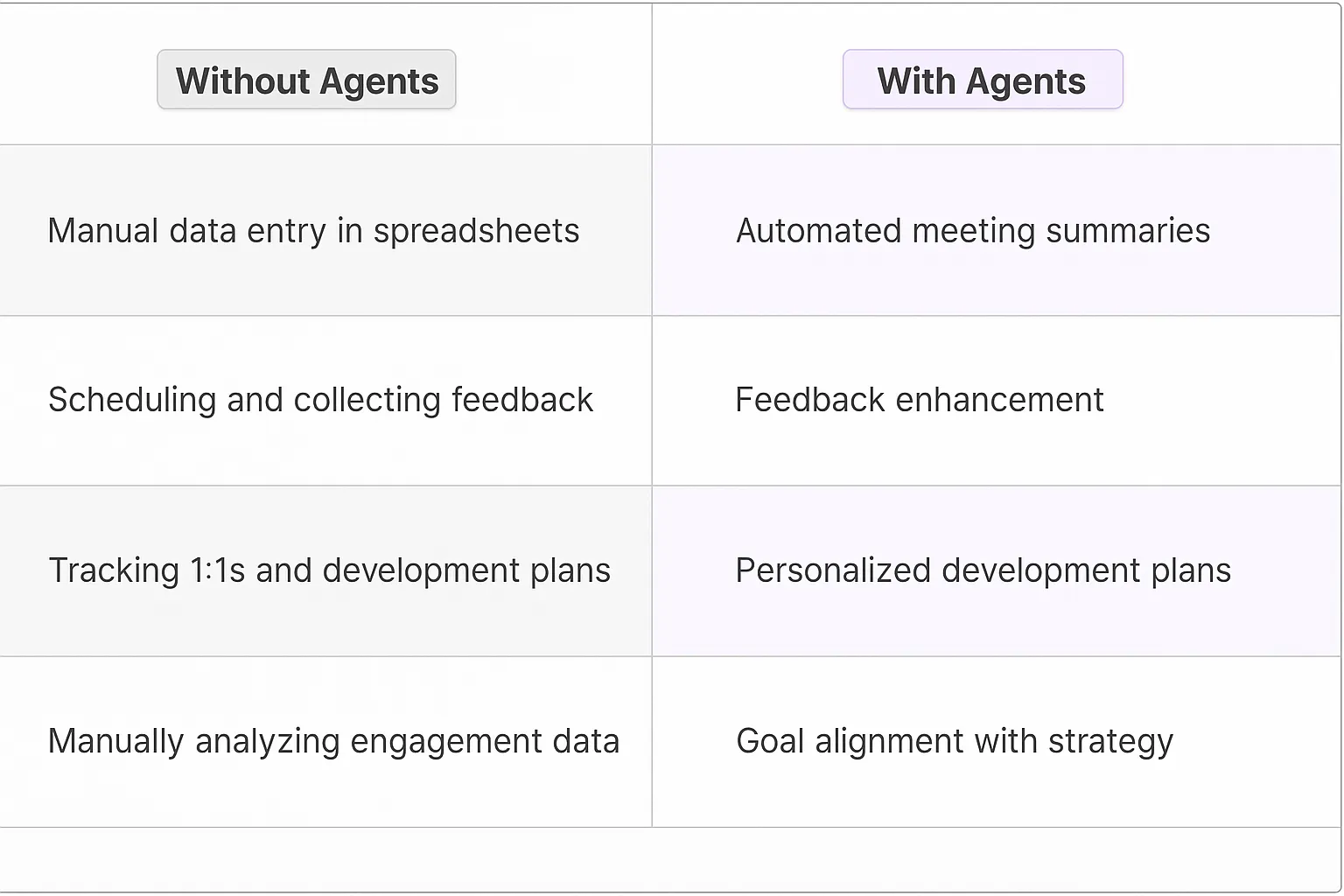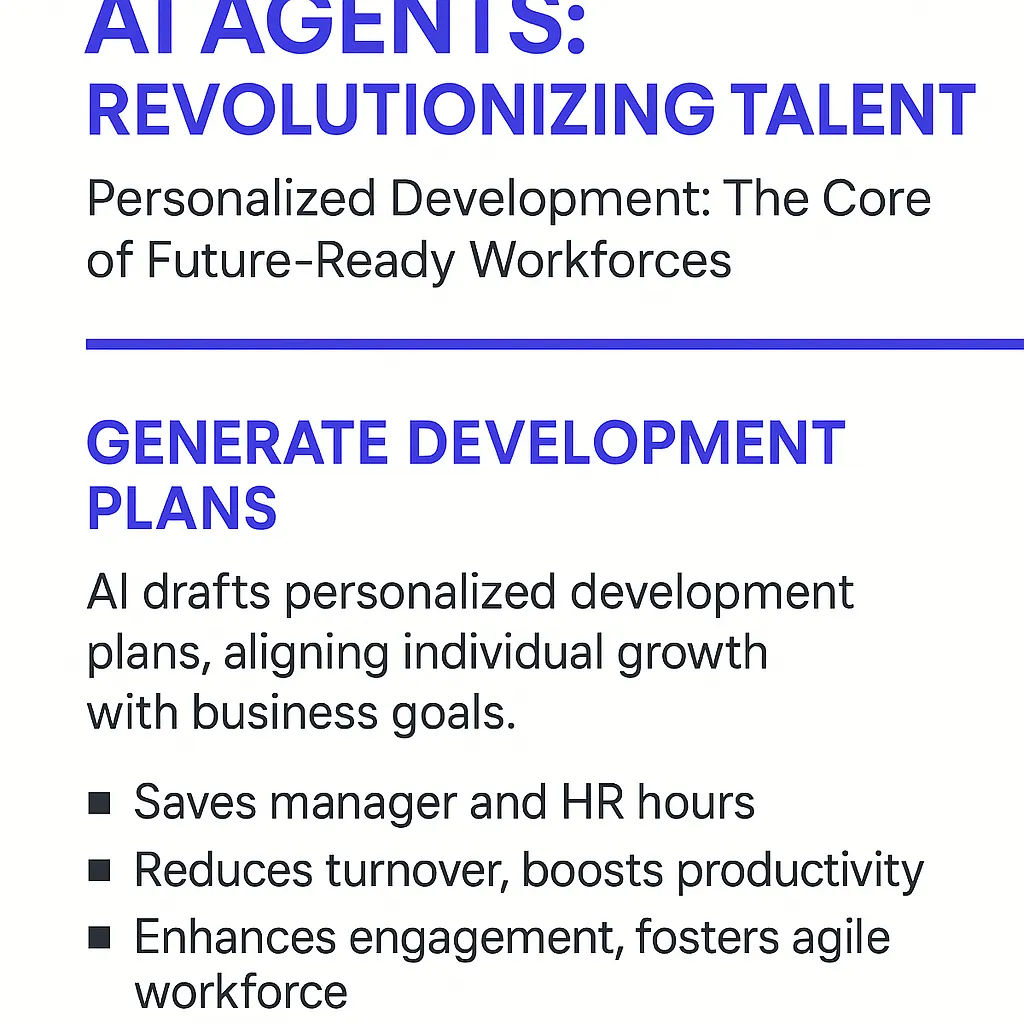Lattice
Understanding Lattice's Performance Management Platform
Lattice stands as a performance management platform that connects employee growth with business success. The platform combines performance reviews, goal-setting, feedback mechanisms, and career development tools into a cohesive system. With the integration of AI Agents, Lattice has evolved from a traditional HR tool into a sophisticated talent development ecosystem.
The platform's core strengths lie in its comprehensive approach to employee development:- Performance review management with customizable frameworks- OKR and goal tracking capabilities- Real-time feedback and recognition systems- Career development planning tools- Analytics and reporting functionalities- Integration capabilities with existing HR systemsThe addition of AI Agents amplifies these features through intelligent automation and predictive analytics.

Benefits of AI Agents for Lattice
What would have been used before AI Agents?
Performance management and employee development traditionally relied on manual data entry, spreadsheet tracking, and endless email chains. HR teams spent countless hours collecting feedback, scheduling reviews, and manually analyzing employee engagement data. Managers struggled to maintain consistent documentation of 1:1s and career development conversations. The process was fragmented, time-intensive, and often resulted in incomplete or outdated information.
What are the benefits of AI Agents?
AI Agents transform how organizations handle performance management and employee development in Lattice through several key mechanisms:
- Automated Meeting Summaries - AI Agents capture and synthesize key points from 1:1s and performance conversations, creating searchable documentation without manual note-taking. This allows managers to stay fully present during discussions while maintaining detailed records.
- Pattern Recognition - By analyzing historical performance data, feedback patterns, and career development trajectories, AI Agents surface meaningful insights about employee growth and potential skill gaps that human analysts might miss.
- Personalized Development Plans - AI Agents craft customized learning recommendations and growth opportunities based on an employee's goals, skills, and performance history. This level of personalization at scale wasn't possible with traditional methods.
- Feedback Enhancement - AI Agents help managers provide more specific, actionable feedback by analyzing past interactions and suggesting concrete examples and improvement areas. This raises the quality of performance conversations across the organization.
- Goal Alignment - Through natural language processing of company objectives and individual goals, AI Agents help ensure employee development plans stay aligned with broader organizational strategy - creating clearer paths for career growth.
The network effects are particularly powerful here: as more performance data flows through the system, the AI Agents become increasingly adept at identifying successful development patterns and surfacing opportunities for employee growth. This creates a continuous feedback loop that strengthens the entire talent development ecosystem.

Potential Use Cases of AI Agents with Lattice
Performance Review Enhancement
AI Agents transform performance reviews from time-consuming obligations into strategic growth opportunities. They analyze historical feedback patterns, identify behavioral trends, and generate specific talking points for managers. This leads to more meaningful conversations focused on employee development rather than just compliance.
Goal Setting & OKR Optimization
The integration of AI Agents with Lattice's goal-tracking capabilities creates a dynamic system for OKR management. These digital teammates analyze past performance data, industry benchmarks, and team capacity to suggest realistic yet challenging objectives. They can spot potential roadblocks before they materialize and propose course corrections in real-time.
Career Development Planning
AI Agents act as career development strategists by mapping out personalized growth trajectories. They analyze skills gaps, identify learning opportunities, and match employees with internal positions that align with their career aspirations. This data-driven approach transforms traditional career planning into a precise, actionable roadmap.
Feedback Loop Enhancement
The continuous feedback loop becomes more sophisticated with AI Agents monitoring communication patterns and sentiment analysis. They identify areas where feedback might be needed, suggest specific recognition opportunities, and help managers maintain consistent engagement with their teams.
Compensation Planning Support
AI Agents bring precision to compensation planning by analyzing market rates, internal equity, and performance metrics. They flag potential retention risks based on compensation disparities and provide data-backed recommendations for salary adjustments and bonus structures.
Team Engagement Analysis
Through sophisticated pattern recognition, AI Agents detect early warning signs of disengagement or burnout. They analyze survey responses, feedback patterns, and performance metrics to identify teams or individuals who might need additional support or recognition.
Meeting Preparation
AI Agents transform 1:1 meetings by compiling relevant performance data, recent achievements, and growth opportunities into focused discussion points. They ensure these crucial conversations are productive and aligned with both individual and organizational goals.
Skills Development Tracking
The AI integration creates a dynamic skills inventory system that tracks skill development across the organization. It identifies emerging skill gaps, suggests targeted learning opportunities, and helps leaders make informed decisions about team development investments.
These use cases represent the convergence of human-centered performance management with AI-powered insights, creating a more effective and engaging employee development ecosystem.

Industry Use Cases
Lattice AI agents transform how organizations approach performance management and employee development. By analyzing patterns across thousands of employee interactions, feedback sessions, and development plans, these digital teammates deliver insights that would take human HR teams months to uncover. The applications span well beyond basic HR functions - from helping sales teams identify coaching opportunities to enabling product teams to better track career progression.
The real power emerges when Lattice AI agents tap into the nuanced dynamics of workplace relationships and team performance. They can detect subtle shifts in employee sentiment, flag potential retention risks before they become critical, and suggest targeted interventions based on successful patterns across the organization. This granular understanding of workplace dynamics creates opportunities for meaningful improvements in how companies develop and retain talent.
What makes these use cases particularly compelling is how they blend quantitative performance data with qualitative human insights. The AI agents don't just process numbers - they understand context, organizational culture, and the human elements that drive workplace success. This combination of analytical horsepower and emotional intelligence opens up new possibilities for how organizations approach talent development.
Technology Industry: Scaling Performance Management with AI
High-growth tech companies face a critical challenge: maintaining consistent performance management while scaling from 50 to 500+ employees. Traditional quarterly reviews become exponentially more complex and time-consuming as organizations expand. A Lattice AI Agent transforms this process by analyzing performance data patterns across engineering, product, and design teams.
The AI agent processes thousands of data points from peer feedback, 1:1 documentation, and OKR tracking to identify key growth opportunities for individual contributors. For software engineers, it can correlate velocity metrics with qualitative feedback to surface actionable insights about technical leadership potential or areas needing skill development.
When a tech company hits hypergrowth, managers often struggle to provide detailed, personalized feedback to expanding teams. The Lattice AI Agent steps in by drafting nuanced performance summaries that combine quantitative metrics with qualitative observations. It identifies patterns in successful career progression paths, helping managers make data-driven promotion and development decisions.
Most importantly, the AI agent maintains consistency in performance evaluation criteria across distributed engineering teams - a common pain point for tech companies with multiple office locations. It ensures that a senior engineer in San Francisco is evaluated using the same framework as their counterpart in London or Singapore.
The network effects become powerful as more performance data flows through the system. The AI agent learns from successful career development patterns, helping tech companies build scalable talent development programs that retain top performers and identify future leaders.
Healthcare: AI-Powered Performance Management in Medical Teams
Large healthcare organizations operate in an environment where performance management directly impacts patient outcomes. A 500-bed hospital system typically manages thousands of clinical staff across multiple specialties, making traditional performance reviews a massive operational challenge. The Lattice AI Agent addresses this by processing the complex web of interdisciplinary feedback that exists in medical environments.
The AI agent analyzes performance patterns across nursing teams, physician teams, and support staff, connecting the dots between individual contributions and department-wide quality metrics. For nursing teams, it correlates patient satisfaction scores with peer feedback and unit performance data, identifying standout leaders and opportunities for skill development.
Medical organizations face unique challenges in maintaining consistent performance standards across different departments and shifts. The Lattice AI Agent tackles this by standardizing evaluation criteria while accounting for the specific demands of each specialty. An ER nurse's performance metrics look very different from those in pediatric care, yet both need fair, contextualized feedback.
The system excels at surfacing hidden talent patterns within healthcare teams. By analyzing thousands of interactions and outcomes, it identifies nurses ready for leadership roles or physicians who excel at mentoring residents. This data-driven approach helps medical organizations build robust succession plans and career development pathways.
As healthcare facilities face increasing pressure to maintain quality while managing costs, the AI agent's ability to link performance management to patient care outcomes becomes invaluable. It helps leadership teams understand which management practices and development investments yield the best results for both staff satisfaction and clinical outcomes.
The network effects in healthcare are particularly powerful - as more organizations contribute data, the AI agent develops deeper insights into what makes medical teams successful. This creates a flywheel effect where better performance management leads to improved patient care, which in turn generates more valuable data for the system to learn from.
Considerations for Lattice AI Implementation
Implementing Lattice AI agents requires careful planning and strategic thinking around both technical architecture and organizational readiness. The complexity increases exponentially when deploying across larger teams and departments.
Technical Considerations
Data integration forms the foundation of any Lattice AI deployment. Organizations need robust APIs and data pipelines to connect their existing HR systems, performance management tools, and communication platforms. The AI agent requires clean, structured data to generate meaningful insights about employee performance and engagement.
Security protocols must account for sensitive personnel information while maintaining appropriate access levels across management tiers. This includes implementing role-based access controls and ensuring data encryption both at rest and in transit.
Operational Challenges
Change management becomes critical when introducing AI-powered performance management. Managers may resist shifting from traditional evaluation methods to data-driven approaches. Clear communication about how the AI agent augments rather than replaces human judgment helps drive adoption.
Training requirements extend beyond basic software usage. Teams need to understand how to interpret AI-generated insights, when to rely on automated suggestions, and when human intervention is necessary. This learning curve varies significantly across different departments and management levels.
Cultural Impact
Organizations must carefully consider how Lattice AI affects company culture. The shift toward quantitative performance metrics can create anxiety among employees accustomed to more qualitative evaluations. Creating transparency around AI decision-making processes helps build trust and acceptance.
Setting realistic expectations about AI capabilities prevents both over-reliance and under-utilization. Teams should understand that Lattice AI serves as a decision support tool rather than an autonomous system for managing human capital.
Resource Requirements
Beyond the initial implementation costs, organizations need dedicated resources for ongoing maintenance and optimization. This includes data scientists to fine-tune algorithms, HR specialists to validate AI recommendations, and IT support to manage technical infrastructure.
Regular audits of AI performance and bias testing require additional oversight to ensure fair and effective performance management across diverse employee populations.
AI-Powered Performance Management: A Transformative Force
The integration of AI Agents with Lattice represents a fundamental shift in how organizations approach talent development. The technology's ability to process vast amounts of performance data, identify patterns, and generate actionable insights creates unprecedented opportunities for scaling effective performance management. While implementation challenges exist, organizations that successfully deploy these tools gain a significant competitive advantage in developing and retaining top talent. The network effects of AI-powered performance management will likely continue to compound, making early adoption increasingly valuable for forward-thinking organizations.













